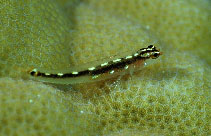| Family: |
Gobiidae (Gobies), subfamily: Gobiinae |
| Max. size: |
2.5 cm SL (male/unsexed) |
| Environment: |
reef-associated; marine; depth range 0 - 40 m |
| Distribution: |
Indo-Pacific: Seychelles eastward through the Coral Triangle and Oceania to Tonga and Samoa. Reported from the Persian Gulf (Ref.80050) and Red Sea (Ref. 84159). |
| Diagnosis: |
Dorsal spines (total): 6-7; Dorsal soft rays (total): 8-10; Anal spines: 1-1; Anal soft rays: 8-9. This species is distinguished by the following characters: cephalic sensory-canal pore system without the NA, PITO & IT pores; dorsal/anal-fin formula 9/8; the fifth pelvic-fin ray 50-80% of the fourth ray; unbranched pectoral rays; caudal fin base with pale-edged black spot (Ref. 107299).
Description: semi-translucent body with internal dark red to blackish mid-lateral stripe; presence of distinctive row of white marks on upper part of dark stripe with few white spots below; longitudinal scale series 23-24; ctenoid scales, absent on head, nape, breast and pectoral fin base; separated pelvic fins, thin membrane joining bases; depth of body 5.5-6.3 in SL (Ref. 90102); SL to 20 mm; females greater than or equal 12 mm gravid |
| Biology: |
Often seen resting on live coral (Ref. 11441, 48637) of lagoon reefs at depths of 1 to over 6 m (Ref. 37816). Often in small groups (Ref 90102). Nektonic (Ref. 75154). |
| IUCN Red List Status: |
Least Concern (LC); Date assessed: 19 June 2017 Ref. (130435)
|
| Threat to humans: |
harmless |
Source and more info: www.fishbase.org. For personal, classroom, and other internal use only. Not for publication.
